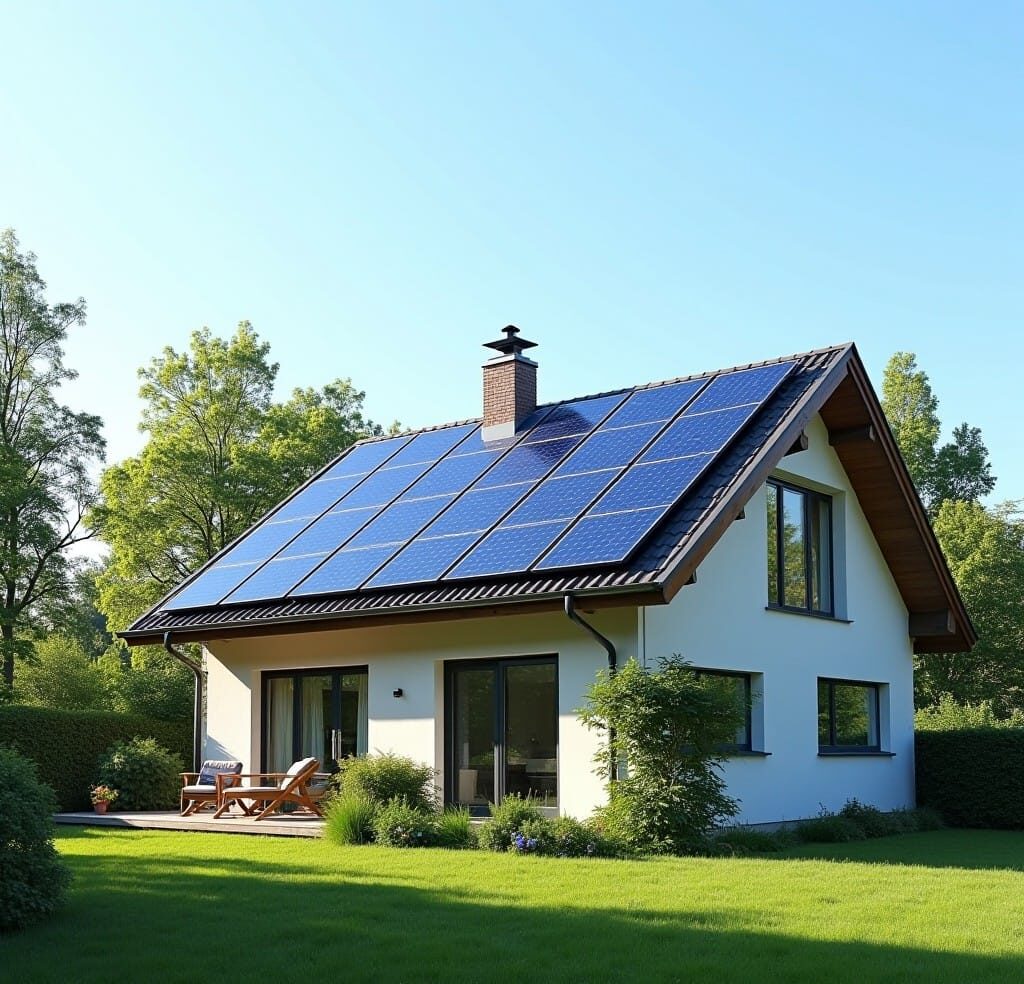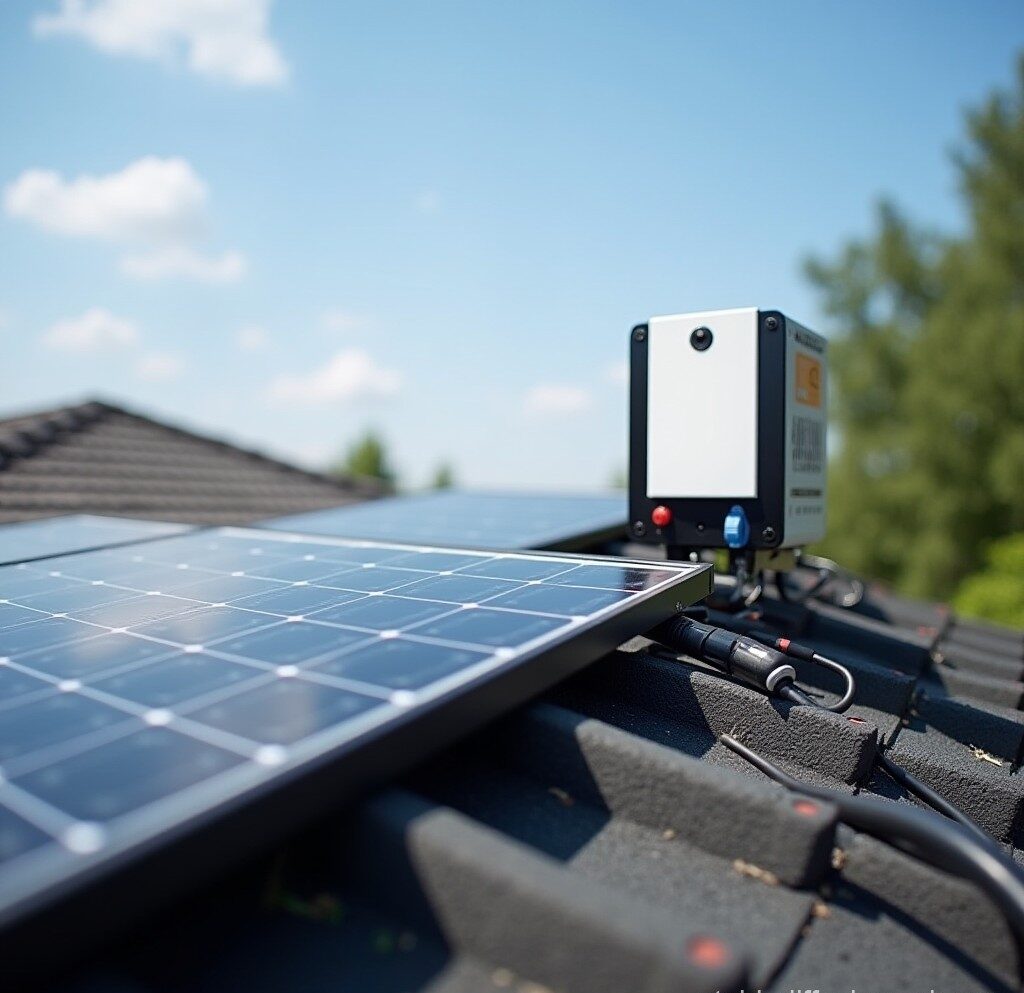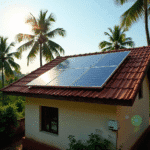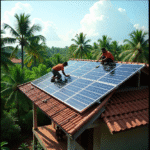
Switching to solar energy is a sustainable choice that offers substantial long-term savings and reduces your carbon footprint. For homeowners, investing in a solar panel for home is an efficient way to lower electricity bills and harness renewable energy. With technological advancements, these systems have become more accessible and affordable. Here, we’ll dive into the benefits, pricing, and details of getting a solar panel for home.
Solar Power Plant With Subsidy – Cost Calculator
What is a Solar Panel for Home?
A solar panel for home converts sunlight into electricity through photovoltaic cells, which then powers various appliances and systems within your residence. These systems come in various capacities, from a modest 1kW solar panel that’s ideal for low-consumption households to larger systems that can support homes with higher energy demands.
Why Choose Solar Panels for Home?
- Cost Savings: Installing solar panels reduces dependency on the grid, lowering electricity bills significantly.
- Environmental Impact: Solar energy is renewable, cutting down on carbon emissions.
- Increase Property Value: Homes with solar panels are more attractive to buyers, often selling at a premium.
- Low Maintenance: Modern solar systems require minimal maintenance, providing long-term benefits.
The upfront solar panel for home price may vary based on the size and quality of the system, but the investment typically pays off in a few years through energy savings. A 1kW solar panel price is relatively budget-friendly, making it an excellent choice for many households in 2024.
Solar Panel for Home Price in 2024
The cost of a solar panel system varies depending on its size, brand, and technology. For instance, a 1kW solar panel price may range from $500 to $1,000, depending on location and brand. A standard solar panel for home generally costs between $2,000 to $10,000, based on energy needs and the number of panels required. It’s essential to calculate your household’s energy consumption to determine the ideal system size and get a precise quote for your setup.
Understanding the 1kW Solar Panel for Home
A 1kW solar panel is a basic unit, ideal for small homes or areas with low power consumption. This setup typically consists of two to four panels and can produce around 3-4 units of electricity daily, which is sufficient for essential appliances like lights, fans, and charging devices. If you’re considering a solar panel for home, a 1kW solar panel could be a cost-effective starting point.
For homes with higher electricity usage, it’s common to install a 5kW or 10kW system to cover the additional load. However, a 1kW solar panel for home price remains one of the most accessible and popular options in 2024 due to its affordability and easy installation process.

Solar Panel for Home Installation Process
- Site Assessment: An installer evaluates your rooftop to ensure proper space and sun exposure.
- Design & Permits: A customized plan is designed, and the necessary permits are obtained.
- Installation: Panels are mounted, and the system is connected to the grid.
- Inspection & Activation: After installation, the system is tested and activated for usage.
Final Thoughts
Investing in a solar panel for home is a smart choice for sustainable energy, especially with 2024 pricing options making it affordable. By opting for a 1kW solar panel, you can take the first step toward energy independence. Make sure to consult a reputable installer to get the best setup for your energy needs.
Switch to solar and start enjoying lower bills, greater energy independence, and the satisfaction of contributing to a greener planet.
From Investment to Savings: Exploring the Cost-Effectiveness of Solar Panels in Kerala
Are you tired of rising electricity bills and looking for a cost-effective solution? Look no further than solar panels! In this article, we will delve into the world of solar energy and explore the cost-effectiveness of solar panels in Kerala. As one of the leading states in India embracing renewable energy, Kerala has witnessed a significant surge in the adoption of solar panels in recent years. But what makes solar panels such a smart investment?
We will uncover the financial benefits of solar energy, including reduced electricity bills, government incentives, and long-term savings. Additionally, we will discuss the environmental advantages of switching to solar power, highlighting how it can help combat climate change and reduce carbon footprint. So, if you are curious about the potential cost savings of solar panels and their positive impact on the environment, keep reading to gain a better understanding of how solar energy can transform your life and save you money in the long run.
Understanding the Cost-Effectiveness of Solar Panels
Solar panels have become increasingly popular in Kerala due to their cost-effectiveness and long-term financial benefits. By harnessing the power of the sun, solar panels generate clean and renewable electricity that can significantly reduce your reliance on traditional energy sources. The initial cost of installing solar panels may seem high, but the long-term savings can outweigh the upfront investment. Solar energy is a sustainable solution that can help you combat rising electricity costs and provide a reliable source of power for your home or business.
Solar panels work by converting sunlight into electricity through photovoltaic cells. These cells contain semiconductors that absorb photons from the sun, generating an electric current. The electricity produced by solar panels can be used to power your home or business, reducing your reliance on the grid and lowering your monthly electricity bills. Furthermore, any excess electricity generated by your solar panels can be fed back into the grid, allowing you to earn credits or even receive payments from your utility company.
Factors Influencing the Cost-Effectiveness of Solar Panels in Kerala
Several factors influence the cost-effectiveness of solar panels in Kerala. The first factor is the amount of sunlight your location receives. Kerala, known as “God’s Own Country,” enjoys abundant sunlight throughout the year, making it an ideal location for solar energy generation. The higher the solar irradiation levels, the more electricity your solar panels can generate, resulting in greater cost savings.
Another factor to consider is the size and efficiency of your solar panel system. The size of your system depends on your energy consumption and available roof space. A larger system can generate more electricity, leading to greater savings. Additionally, the efficiency of your solar panels plays a crucial role in maximizing cost-effectiveness. Higher efficiency panels convert a greater percentage of sunlight into electricity, ensuring optimal performance and higher savings over time.
The orientation and tilt angle of your solar panels also impact their efficiency. Ideally, solar panels should face south and have a tilt angle that matches your latitude. This positioning allows for maximum exposure to sunlight and ensures optimal electricity generation. However, solar panels can still be effective even if they are not perfectly oriented or tilted. Modern solar panel technologies have improved to capture sunlight from various angles, making them suitable for a wide range of installations.
Government Incentives and Subsidies for Solar Panel Installation in Kerala
The Kerala government has implemented several incentives and subsidies to promote the adoption of solar panels in the state. These incentives aim to make solar energy more affordable and accessible to residents and businesses.
One of the major incentives is the net metering policy. Under this policy, any excess electricity generated by your solar panels is fed back into the grid, allowing you to earn credits. These credits can be used to offset your future electricity bills, effectively reducing your overall expenses. In some cases, if your solar panels consistently generate more electricity than you consume, you may even receive payments from your utility company.
Additionally, the government provides financial support through various subsidy schemes. These subsidies can significantly reduce the upfront cost of installing solar panels, making them more affordable for individuals and businesses. The exact subsidy amount depends on the capacity of your solar panel system and other eligibility criteria set by the government. It is essential to research and understand the available subsidies to make the most cost-effective decision when installing solar panels in Kerala.
Calculating the Return on Investment (ROI) for Solar Panels in Kerala
Calculating the return on investment (ROI) is an essential step in determining the cost-effectiveness of solar panels in Kerala. The ROI represents the time it takes to recover the initial investment through savings on electricity bills.
To calculate the ROI, you need to consider the upfront cost of installing solar panels, including the cost of equipment, installation, and any additional components. You also need to factor in the savings generated by your solar panels, taking into account the reduced electricity bills and any incentives or subsidies received.
Let’s consider an example to illustrate the ROI calculation. Suppose you have a 10-kilowatt solar panel system installed at a cost of ₹6 lakhs (after MNRE Subsidy). The average monthly electricity bill before installing solar panels is ₹10,000 . After installing the solar panels, your monthly bill drops to ₹3,00. Taking into account the net metering credits earned and the subsidies received, let’s assume you save an average of ₹10,000 per month.
Using these figures, we can calculate the monthly savings generated by the solar panels. The annual savings would be ₹10,000 x 12 = ₹1,20,000. Dividing the upfront cost of ₹6 lakhs by the annual savings of ₹1,20,000, we can determine the ROI: ₹6,00,000 / ₹1,20,000 = 5 years.
In this example, it would take approximately 5 years to recover the initial investment through savings on electricity bills. Beyond that, you would continue to enjoy cost savings for the lifespan of your solar panel system, which can be 25 years or more. The ROI calculation demonstrates the long-term financial benefits of solar panels and highlights their cost-effectiveness in Kerala.
Tips for Maximizing the Cost-Effectiveness of Solar Panels in Kerala
To maximize the cost-effectiveness of solar panels in Kerala, consider the following tips:
1. **Choose a reputable solar panel installer**: Selecting an experienced and reliable installer ensures that your solar panels are installed correctly and efficiently. This can help optimize their performance and maximize cost savings.
2. **Invest in high-quality solar panels**: While the initial cost may be higher, investing in high-quality solar panels ensures their longevity and efficiency. High-quality panels are more durable, perform better, and require less maintenance, resulting in greater cost savings over time.
3. **Monitor and maintain your solar panel system**: Regularly monitoring your solar panel system allows you to identify any issues or inefficiencies promptly. Proper maintenance, such as cleaning the panels and checking for any shading or obstructions, ensures optimal performance and maximum electricity generation.
4. **Consider energy-efficient appliances and practices**: Combining solar panels with energy-efficient appliances and practices can further enhance cost savings. Energy-efficient appliances consume less electricity and can help reduce your overall energy consumption, maximizing the benefits of your solar panel system.
5. **Educate yourself on government incentives and subsidies**: Stay informed about the latest government incentives and subsidies available for solar panel installations. Taking advantage of these financial support schemes can significantly reduce the upfront cost and improve the cost-effectiveness of your solar panel system.
By implementing these tips, you can maximize the cost-effectiveness of solar panels in Kerala and enjoy substantial savings on your electricity bills.
Common Misconceptions About the Cost-Effectiveness of Solar Panels
Despite the numerous benefits and cost savings associated with solar panels, there are still some common misconceptions that may discourage individuals from considering solar energy. Let’s debunk a few of these misconceptions:
**1. Solar panels are too expensive**: While solar panels do require an upfront investment, the long-term savings they offer make them a cost-effective solution. Government incentives and subsidies further reduce the overall cost, making solar panels more affordable for individuals and businesses.
**2. Solar panels are not efficient in cloudy or rainy climates**: Solar panels can still generate electricity even on cloudy or rainy days. While direct sunlight is optimal, modern solar panel technologies have improved to capture diffuse sunlight and convert it into electricity. Kerala’s abundant sunlight throughout the year makes it an ideal location for solar energy generation.
**3. Solar panels require constant maintenance**: Solar panels are designed to be durable and low-maintenance. Regular cleaning and occasional inspections are typically all that is required to ensure optimal performance. Additionally, most solar panel manufacturers offer warranties that cover any potential issues during the lifespan of the panels.
**4. Solar panels are not aesthetically pleasing**: Solar panel designs have evolved significantly over the years, offering more aesthetically appealing options. From sleek black panels to integrated roof tiles, there are various designs available to suit different architectural styles and preferences.
Debunking these misconceptions helps individuals make informed decisions about solar panel installations and encourages the adoption of solar energy in Kerala.
The Future of Solar Panels in Kerala
Solar panels have proven to be a cost-effective and sustainable solution for individuals and businesses in Kerala. With abundant sunlight, government incentives, and long-term savings, solar energy is transforming the way we power our homes and businesses. By reducing electricity bills, combating climate change, and reducing carbon footprint, solar panels offer a brighter and greener future for Kerala.
As technology continues to advance and solar panel costs decrease, we can expect to see even greater adoption of solar energy in Kerala. With the government’s commitment to renewable energy and the growing awareness of the benefits of solar panels, more individuals and businesses will embrace solar energy as a smart investment. The cost-effectiveness, environmental advantages, and long-term savings of solar panels make them an attractive option for anyone looking to reduce their reliance on traditional energy sources and secure a sustainable future.
So, if you’re tired of rising electricity bills and want to save money while making a positive impact on the environment, consider investing in solar panels in Kerala. Harnessing the power of the sun can transform your life and provide you with a cost-effective and sustainable energy solution for years to come.
This 3000-word blog article has covered various aspects of the cost-effectiveness of solar panels in Kerala. From understanding how solar panels work to exploring government incentives and case studies, readers have gained valuable insights into the financial benefits and environmental advantages of solar energy in Kerala. The article also provided tips for maximizing the cost-effectiveness of solar panels, discussed financing options, and debunked common misconceptions. By emphasizing the future potential of solar panels in Kerala, the article encourages readers to consider solar energy as a smart investment for long-term savings and a greener future.







3 responses to “Affordable Solar Panel for Home: Best Prices & 1kW Solar Panel Options in 2025”
[…] How long does it take to install a home solar system in Udayamperoor?A4: Typically from consultation to commissioning can vary 2-6 weeks (depends on […]
[…] and after-sales, Galian Watts covers all phases of your solar journey. Whether you need on-grid solar solution for home, hybrid solar for backup + grid, or larger commercial solar installations, Galian Watts is […]
[…] Solar Solutions: Galian Watts provides on-grid, off-grid, and hybrid solar systems — from 1 kW residential solar to larger rooftop […]